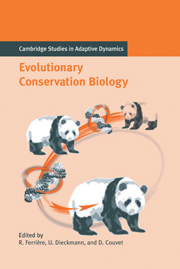Book contents
- Frontmatter
- Contents
- Contributing Authors
- Acknowledgments
- Notational Standards
- 1 Introduction
- Part A Theory of Extinction
- Part B The Pace of Adaptive Responses to Environmental Change
- Part C Genetic and Ecological Bases of Adaptive Responses
- Part D Spatial Structure
- 12 Genetic Structure in Heterogeneous Environments
- 13 Conservation Implications of Niche Conservatism and Evolution in Heterogeneous Environments
- 14 Adaptive Responses to Landscape Disturbances: Theory
- 15 Adaptive Responses to Landscape Disturbances: Empirical Evidence
- Part E Community Structure
- References
- Index
- The International Institute for Applied Systems Analysis
13 - Conservation Implications of Niche Conservatism and Evolution in Heterogeneous Environments
Published online by Cambridge University Press: 15 August 2009
- Frontmatter
- Contents
- Contributing Authors
- Acknowledgments
- Notational Standards
- 1 Introduction
- Part A Theory of Extinction
- Part B The Pace of Adaptive Responses to Environmental Change
- Part C Genetic and Ecological Bases of Adaptive Responses
- Part D Spatial Structure
- 12 Genetic Structure in Heterogeneous Environments
- 13 Conservation Implications of Niche Conservatism and Evolution in Heterogeneous Environments
- 14 Adaptive Responses to Landscape Disturbances: Theory
- 15 Adaptive Responses to Landscape Disturbances: Empirical Evidence
- Part E Community Structure
- References
- Index
- The International Institute for Applied Systems Analysis
Summary
Introduction
Species may, in principle, respond to environmental change in several different ways (Pease et al. 1989; Holt 1990; Chapters 10 and 11). Some species may track environmental states to which they are already well adapted and so shift in abundance and distribution. Other species may not evolve at all and so become extinct. Some species may evolve adaptively in ways that facilitate their persistence in changed environments. Yet other species may evolve in ways that hamper their long-term viability. A fundamental goal of the discipline of evolutionary conservation biology is to understand the factors that govern the relative likelihood of each of these outcomes.
Recognizing the importance of directional environmental change in driving extinctions in once-common species raises a profound puzzle. On the one hand, as ecologists we know that extinction risk emerges because directional environmental changes lead to lowered population abundances and/or restricted distributions; in effect, species are pushed outside their niches. On the other, as evolutionists we know that species often have abundant genetic variation, and so can adapt to novel circumstances. Conservation problems arise precisely because species do not adapt sufficiently to the new environments created by anthropogenic activity. In other words, conservation problems reflect a seeming failure of evolution by natural selection to adapt species to environmental change.
Such failures are examples of “niche conservatism”.
- Type
- Chapter
- Information
- Evolutionary Conservation Biology , pp. 244 - 264Publisher: Cambridge University PressPrint publication year: 2004
- 46
- Cited by

